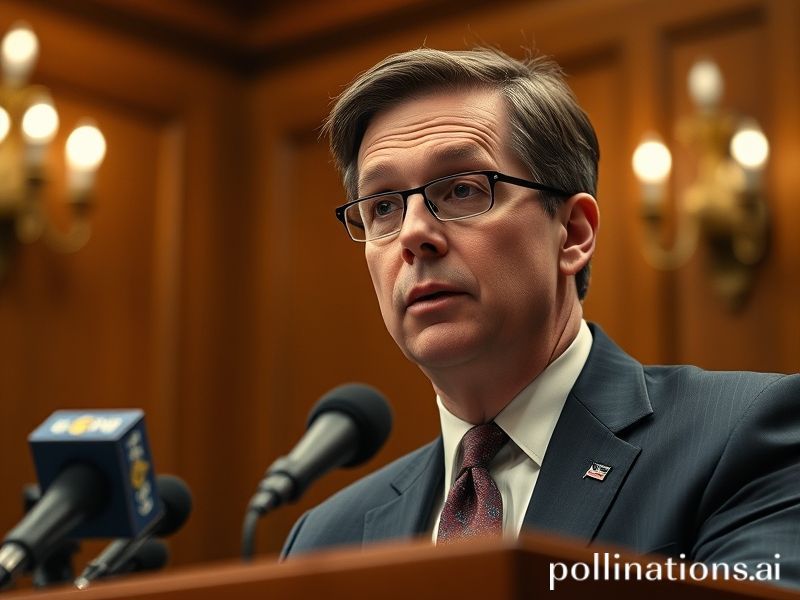Brendan Carr’s Global Game of Regulatory Whac-A-Mole: How One U.S. Commissioner Rewrites the World’s Playbook
When the name Brendan Carr first appears on a foreign desk’s wire feed, the immediate instinct is to ask which hemisphere he’s currently irritating. The answer, reliably, is all of them. As the senior Republican commissioner of the United States Federal Communications Commission, Carr has spent the last decade transforming what used to be a glorified spectrum-accountancy office into a one-man geopolitical wrecking ball—part telecoms technocrat, part Cold-War cosplayer, and full-time provider of sleepless nights from Brussels to Beijing.
Europeans, still nursing GDPR hangovers, now watch Carr’s crusade against TikTok with the weary fascination of bystanders witnessing someone set his own house on fire to roast a marshmallow. When Carr demanded Apple and Google expel the app from U.S. stores last year, officials in Paris quietly calculated how many French influencers would need therapy if their 15-second dopamine rations vanished overnight. Berlin’s digital ministry simply updated its contingency plan titled “If the Americans Start Another Trade War, Try Not to Look Surprised.”
Asia, meanwhile, has observed Carr’s antics with that special cocktail of bemusement and déjà vu only a continent repeatedly labeled “emerging threat” can muster. In Delhi, bureaucrats note that Carr’s proposed ban on Chinese telecom gear is a carbon copy of India’s 2020 playbook—except Washington attached a PowerPoint presentation and a congressional hearing. Seoul’s semiconductor executives have started a betting pool on the over/under for when Carr will discover South Korea’s own data localization laws and declare them a “national-security mirage.”
The global South watches the spectacle more darkly. For African regulators accustomed to negotiating bandwidth prices in Swiss francs they’ve never actually seen, Carr’s moral panic about 5G surveillance reads like a luxury problem. Lagos tech hubs have begun printing T-shirts: “My president can’t spy on me—he can’t even keep the lights on.” In Buenos Aires, where inflation turns every smartphone into a volatile asset class, officials sigh that at least Carr’s proposed Huawei bans give them a new excuse when the networks crash: “It’s not our economy, it’s the gringo embargo.”
Carr’s genius, if we must call it that, lies in weaponizing domestic culture-war tedium into border-crossing policy shrapnel. His latest hobbyhorse—requiring U.S. tech firms to store American data exclusively on American soil—sounds perfectly patriotic in a Senate hearing room. Translated into international bureaucratese, it’s a unilateral rewrite of global cloud architecture, forcing Dublin server farms and Singapore data lakes to choose between legal schizophrenia or commercial Siberia. The European Commission responded with the diplomatic equivalent of a subtweet: a 47-page “impact assessment” whose footnotes read like passive-aggressive haikus.
Of course, the joke is on everyone involved. Carr’s fiercest speeches warn that authoritarian regimes will exploit telecom networks to erode liberty—an argument delivered via networks built, in no small part, by authoritarian regimes. His smartphone likely contains cobalt mined by a teenager in the DRC, assembled in a Chinese megafactory, and shipped through a global supply chain that laughs at national borders. Yet here we are, pretending that banning an app famous for dance routines will somehow rebalance the world order.
The broader significance, for anyone keeping score beyond the Beltway, is that Carr represents a new breed of techno-nationalist bureaucrat: less interested in governing the airwaves than in airbrushing the globe into friend-or-foe caricatures. Every regulatory memo he drafts in Washington ricochets outward as de facto global law, because Apple and Google would rather delist an app in 190 countries than customize for one commissioner’s mood swings. In that sense, Carr is the unwitting author of the first truly American export that costs nothing to ship: paranoia.
And so, as another workday ends in the world’s ministries of digital whatever, officials from Ottawa to Canberra update their risk matrices and wonder how long before Commissioner Carr discovers their browser histories. The answer, naturally, is classified—though if you’re reading this on a phone, he probably already has. Sleep tight; the signal is global, but the mood remains distinctly local: somewhere between a shrug and a slow-motion scream.







